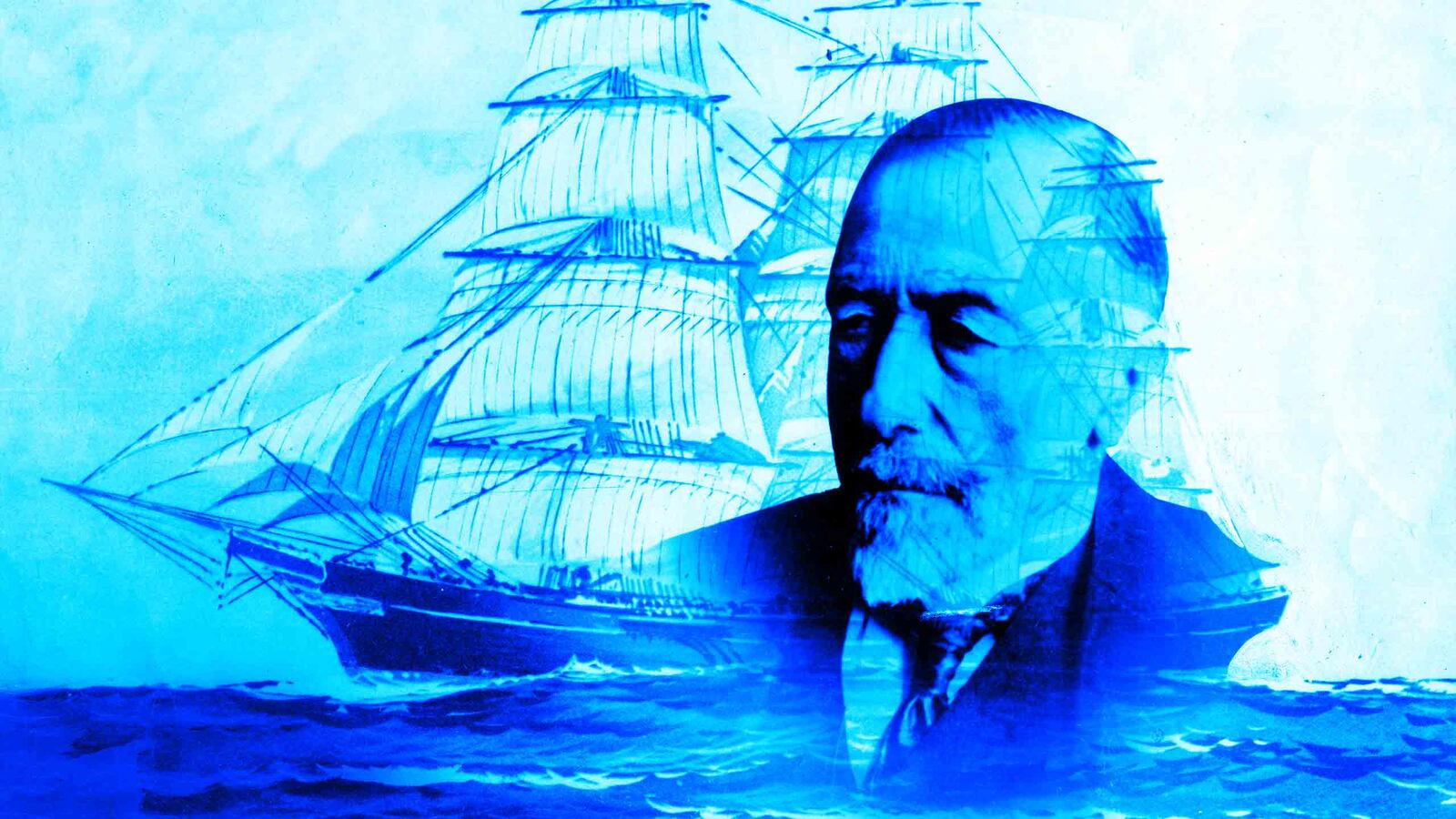Konrad Korzeniowski was born a landlocked Pole and went to sea. He traveled throughout Southeast Asia in an era of multicultural, racial, and political change, when sail was giving way to the new technology of steam. Made his way up the Congo River at the height of racist imperialism. Settled in England as an immigrant with sketchy English-language skills, at a time when terrorists had London on edge.
Imperialism, colonialism, racism, capitalism, terrorism, nationalism, immigration, the rise of America as a world power. All these subjects became fodder for books written by Korzeniowski, whose nom de plume was Joseph Conrad. Writing at the tail end of the 19th century and the beginning of the 20th, Conrad, who became one of the English language’s foremost authors, not only experienced many of the forces that still affect us today, but those influences made him the first novelist with a truly global perspective.
“Conrad’s experiences as an immigrant and working as a sailor give him an outlook different from his peers,” says Maya Jasanoff, author of The Dawn Watch: Joseph Conrad In A Global World, a new book tracing Conrad’s concerns from his time to the present day. “He’s writing about international connections of different kinds, routes of trade, migration, capital, which determine our life today.”
Jasanoff’s book is both a biography of Conrad and an in-depth analysis of four of his novels. Through these books, she shows how Conrad’s global reach reflects our contemporary concerns: The Secret Agent is involved with terrorists, immigrants, and Russian government provocateurs in London. Lord Jim, set in Asia, deals with multiculturalism, colonization, the growth of global capitalism, and technological change. Heart of Darkness, located in the Congo and undoubtedly Conrad’s most famous work (and the inspiration for the film Apocalypse Now), is described by Jasanoff in her book as “a touchstone for thinking about Africa and Europe, civilization and savagery, imperialism, genocide, insanity—about human nature itself.” And Nostromo is a South American tale of imperialism, the struggle for natural resources and the rise of American capitalist power.
“In all his writing, wherever it was set,” writes Jasanoff, “Conrad grappled with the ramifications of living in a global world: the moral and material impact of dislocation, the tension and opportunity of multiethnic societies, the disruption wrought by technological change.”
Conrad grew up in a Poland ruled by Russia. His father was a Polish nationalist who was arrested for his activities, which affected the son’s attitude toward nationalist and populist movements of almost any kind. “Conrad came of age feeling skeptical of the power of nationalism to achieve positive change,” Jasanoff told The Daily Beast, “and as an immigrant he was aware of the pros and cons of nationalism.”
Conrad was also aware of the downside of technological change, and what he saw as the greed and hypocrisy of American capitalism. When he first went to sea at age 16, Conrad entered the world of sailing ships. But decades later, when he began his writing career, sail had given way to steam, which affected the employment opportunities for Conrad and his mates. Steamships needed sailors with different skills, and as ships became bigger, that cut down on the number of ships and job availability. This “made him very skeptical of the idea that technological change actually was the same as ‘progress’ as the boosters of industrialization and digitization have long held it to be,” says Jasanoff. “He knew that technological change had losers as well as winners. This was true in a narrow way for the sailors who were displaced by steamships. But for Conrad it came to be true in a broader sense, as he saw the coming of new technologies as displacing older, and to him preferable, ways of life.”
But it was his feelings about late 19th century capitalism, and the rise of American power, that brought out the best in Conrad. In Nostromo, easily his most prescient, and possibly his best, novel, Conrad wrote about the fight for a South American silver mining concession, which involved British, American, and local interests. The book takes a bleak view of U.S. capitalism and its ability to destroy everything in its path in the name of “progress.” It is also, in some ways, a response to the American political and economic machinations that led to the creation of the Panama Canal.
“We shall run the world’s business whether the world likes it or not,” says an American tycoon in Nostromo, a statement that perfectly reflects Conrad’s disdain for the era of rapacious capitalism and imperialist intervention.
“Conrad saw the U.S. as being the spokesperson for the expansion of this unprincipled extraction by material interests,” says Jasanoff. “An unprincipled, greedy way of proceeding in the world. He believed the U.S. was talking a good game, and it’s clearly hypocritical. For him, the promise of America is a promise of material progress that clothes itself in ideals of nationalism when it suits itself, but advances greed and distorts people’s lives.”
Not that Conrad wasn’t also a man of his time. He believed strongly in the British empire, feeling it was actually trying to do some good. His books also reflect some of the racism and anti-Semitism of the era, and are generally lacking in strong female characters.
But his multicultural experiences—at least one-third of his shipmates were not British—and his wide-ranging travels helped create a worldview that was more expansive than his contemporaries’. And his strong moral sense caused him to express his disgust at the European barbarism he saw in the Congo, where Belgians claimed to be bringing “civilization” to the natives. For Conrad, says Jasanoff in her book, “the problem wasn’t a hypocritical betrayal of civilization—it was the European notion of civilization as a good in itself.” In other words, Conrad was hip to the hypocrisy of nation-building before that was even a term.
What would Conrad think of today’s world? Jasanoff believes “he would be quick to notice the hollowing out of social intercourse and civic connection. He’d be skeptical of the claims by some techno-utopians who say the internet will make us a big happy family. He would gravitate towards the ways in which idealism is thrown around without actually being backed up. I think he’s good at noticing where practices don’t live up to ideals.”
And there’s this. Conrad’s message to our world, says Jasanoff is, ultimately, both simple and skeptical: “We’ve been here before, and there’s no easy fix.”






